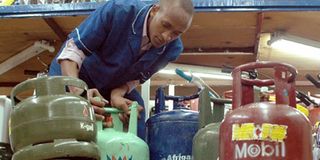Breaking News: Old Kijabe dam tragedy: Death toll rises to 45
Cheaper cooking gas prices to stay until next June

A vendor inspects cooking gas cylinders. PHOTO | FILE | NATION MEDIA GROUP
What you need to know:
- Treasury Secretary Ukur Yatani had sought to scrap liquefied petroleum gas from the list of zero-rated items effective July 1.
- Under the move to remove LPG from tax-exempt goods, Kenyans were set to incur an extra Sh300 to buy the 13-kilogramme cooking gas that currently retails at between Sh2,100 and Sh2,200.
Kenyans will continue enjoying cheap cooking gas until next June after Parliament pushed back the 14 per cent value-added tax (VAT) the Treasury introduced in the Finance Act 2020.
Treasury Secretary Ukur Yatani had sought to scrap liquefied petroleum gas (LPG) from the list of zero-rated items effective July 1 but MPs pushed it to next year, citing hard economic times in the wake of the coronavirus pandemic.
Parliament had rejected the move to scrap LPG from tax-exempt items but later agreed to push it to next year under the tax measures that come into effect on Wednesday.
Under the move to remove LPG from tax-exempt goods, Kenyans were set to incur an extra Sh300 to buy the 13-kilogramme cooking gas that currently retails at between Sh2,100 and Sh2,200 at a time they are grappling with job losses and depressed earnings due to the effects of Covid-19.
“The Act has deleted the following items from the zero-rating schedule, The Act has deleted the following items from the zero-rating schedule, effective date July 1, 2021,” said the Kenya Revenue Authority.
TAX SCRAPPED
The move by lawmakers is a reprieve for Kenyans who have since June 2016 been enjoying low cooking gas prices after the Treasury scrapped the tax on LPG to cut costs and boost uptake among the poor who rely on dirty kerosene and charcoal for cooking.
The implementation of 14 percent VAT next year would increase LPG prices at a time they were anticipated to fall due to the plunge in global prices of crude oil in the wake of the coronavirus pandemic and high production.
The LPG prices are not controlled, unlike other petroleum products and the new tax fuels fears that dealers could exploit the market forces to their advantage even as international crude prices continue to fall.
STATE RESTRICTIONS
Cooking gas prices were expected to decline in line with the crude oil prices, which fell to a two-decade low, while demand was set to rise slightly as more Kenyans stay at home due to state restrictions to curb the spread of the Covid-19.
The rise in the cost of cooking gas is expected to pile pressure on families that are struggling to foot daily bills due to job losses and drastic cuts in earnings in the wake of the coronavirus pandemic.
Cooking gas prices for the 13-kilogramme fell to lows of Sh2,000 in October 2016 after the Treasury scrapped the 16 percent VAT.




